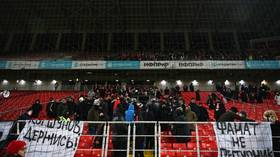Russia passes controversial new ID law
Russian politicians have adopted the third and final reading of a contentious new bill which will create ID for football fans who want to attend matches from summer 2022.
The system, which will reportedly cost around $10.5 million to implement, is expected to come into effect on June 1 2022.
The Russian government will decide on a list of official competitions where participants and fans must be mandatorily identified.
Tickets for the events involved will be sold only to those with a valid Fan ID, which will be available on a public services portal via a process that Russian Sports Minister Oleg Matytsin has previously claimed will be quick and straightforward, with many users already having their registration data pre-filled.
The Russian parliament has approved a controversial law that will introduce Fan IDs to major sporting events. Fan groups of most Russian clubs oppose the move, but the law's supporters believe that it will help increase the security and accessibility of sport in the country.
— Russian Football News (@RusFootballNews) December 17, 2021
Organizers will be obliged to transfer data to a fan ID information system, and any decisions related to which competitions will be chosen for mandatory identification are to be made by the Cabinet "taking into account the peculiarities of a particular sport and depending on the level of the sporting event".
Fans can potentially be denied a Fan ID or have a valid document frozen if they have previously violated public order at an event, including those outside Russia, or if it becomes known that they intend to commit such acts.
Anyone who has had their ID denied or suspended can appeal the decision in court.
Fan ID is a Russian innovation borne out of the country's successful hosting of the 2017 Confederations Cup and 2018 FIFA World Cup, with those who bought tickets to either event receiving a personalized spectator card.
With it, fans could also travel for free between host cities and use public transport, while there was also visa-free entry to the country for foreigners.
The introduction of fan ID has divided opinion in local politics and sport, with Russian politician and three-time Olympic figure skating champion Irina Rodnina telling Championat that "when there are some restrictions and problems, few people are happy".
"We probably need to make such decisions if we want it to be safe and calm at the stadiums," she suggested.
"To go with your family, young children and watch interesting matches. Such bills are not accepted in figure skating, in rhythmic gymnastics. Fortunately, our fans are safer. In football, we are used to facing such problems, [but] I'm not saying that everyone is like that.
"We must get used to the fact that there must be a certain form and norm of human behavior at sports facilities.
The first 2017 FIFA Confederations Cup and 2018 FIFA World Cup fan ID issuing centre opened in St. Petersburg https://t.co/pY9rJSU7vnpic.twitter.com/mojbglUHp9
— Government of Russia (@GovernmentRF) December 7, 2016
"This is not a place to [express your anger] – athletes compete there, fans must be within certain limits. An athlete is penalized if he violates any of the requirements.
"Can beer be returned to stadiums? We will see. Laws are subject to change. We did a very good job during the World Cup; there were no unpleasant incidents."
The president of Russian Premier League (RPL) side Ural, Grigory Ivanov, told the same outlet: "I have said 20 times that I am against the introduction of Fan ID. I have not changed my opinion now."
State Duma member and Olympic speed skating champion Svetlana Zhurova played down fears that ID would be required at all games in Russia by saying that it had been partly introduced in order to hold international competitions.
"In theory, Fan ID may not apply to RPL matches," she said. "Now the government will talk with the fan community, maybe they will say that this is not necessary for the RPL.
Вираж покидает Зенит-Арену на 40 минуте матча Зенит-Динамо. pic.twitter.com/JNKerTP03U
— Акуна Матата (@4everRussia) December 6, 2019
Before the move was confirmed on Friday, Zhurova had also said that "normal fans" had nothing to worry about in a nod to recent crowd trouble.
“Everything will be fine – the system was invented in order to catch violent and dangerous threats to society," she said.
"The Fan ID will allow offenders and provocateurs to be identified and prevent the repetition of illegal actions."
Some supporters feel that the introduction of Fan ID is unfair, insisting that they are not criminals while feeling that they are being mistreated.
Protest banners have been held aloft in stands and walk-outs have been witnessed at RPL matches.
Фанаты ЦСКА устроили пиротехническое шоу после матча с "Зенитом"🙂 pic.twitter.com/fVKOrUCXfO
— лис (@Kt7dR49Tb3QxcnI) November 29, 2021
But their plight was not helped by chaotic scenes last month when riot police had to be brought in to detain hundreds in a clash between swathes of the CSKA Moscow and Zenit St Petersburg faithful.
Crimes allegedly committed during the 2-0 away win for league leaders Zenit included the illegal use of pyrotechnics, consumption of alcohol in prohibited spaces, petty hooliganism and evasion of arrest.
And while former heavyweight champion Nikolai Valuev, who is now a Duma deputy, remarked that scenes of flares being let off provided "direct proof" of Fan ID being required, a Twitter onlooker reacting to this week's news said the move was "madness".
"The grounds are empty as it is," they said. "Tourists will also be affected by this."















